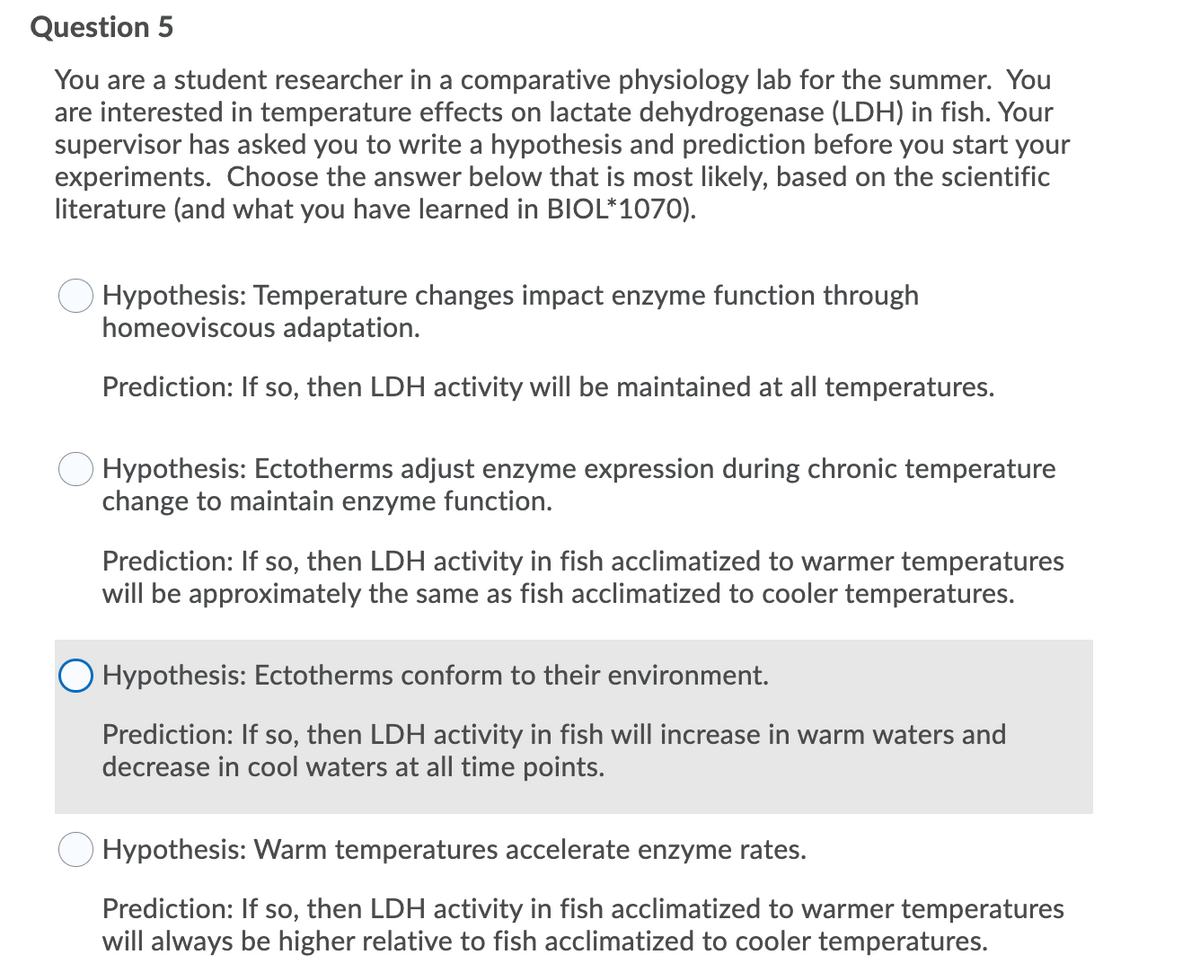Question 5 You are a student researcher in a comparative physiology lab for the summer. You are interested in temperature effects on lactate dehydrogenase (LDH) in fish. Your supervisor has asked you to write a hypothesis and prediction before you start your experiments. Choose the answer below that is most likely, based on the scientific literature (and what you have learned in BIOL*1070). Hypothesis: Temperature changes impact enzyme function through homeoviscous adaptation. Prediction: If so, then LDH activity will be maintained at all temperatures. Hypothesis: Ectotherms adjust enzyme expression during chronic temperature change to maintain enzyme function. Prediction: If so, then LDH activity in fish acclimatized to warmer temperatures will be approximately the same as fish acclimatized to cooler temperatures. O Hypothesis: Ectotherms conform to their environment. Prediction: If so, then LDH activity in fish will increase in warm waters and decrease in cool waters at all time points. O Hypothesis: Warm temperatures accelerate enzyme rates. Prediction: If so, then LDH activity in fish acclimatized to warmer temperatures will always be higher relative to fish acclimatized to cooler temperatures.
Question 5 You are a student researcher in a comparative physiology lab for the summer. You are interested in temperature effects on lactate dehydrogenase (LDH) in fish. Your supervisor has asked you to write a hypothesis and prediction before you start your experiments. Choose the answer below that is most likely, based on the scientific literature (and what you have learned in BIOL*1070). Hypothesis: Temperature changes impact enzyme function through homeoviscous adaptation. Prediction: If so, then LDH activity will be maintained at all temperatures. Hypothesis: Ectotherms adjust enzyme expression during chronic temperature change to maintain enzyme function. Prediction: If so, then LDH activity in fish acclimatized to warmer temperatures will be approximately the same as fish acclimatized to cooler temperatures. O Hypothesis: Ectotherms conform to their environment. Prediction: If so, then LDH activity in fish will increase in warm waters and decrease in cool waters at all time points. O Hypothesis: Warm temperatures accelerate enzyme rates. Prediction: If so, then LDH activity in fish acclimatized to warmer temperatures will always be higher relative to fish acclimatized to cooler temperatures.
Human Anatomy & Physiology (11th Edition)
11th Edition
ISBN:9780134580999
Author:Elaine N. Marieb, Katja N. Hoehn
Publisher:Elaine N. Marieb, Katja N. Hoehn
Chapter1: The Human Body: An Orientation
Section: Chapter Questions
Problem 1RQ: The correct sequence of levels forming the structural hierarchy is A. (a) organ, organ system,...
Related questions
Question
100%
PLS,,, HELP ASAPP

Transcribed Image Text:Question 5
You are a student researcher in a comparative physiology lab for the summer. You
are interested in temperature effects on lactate dehydrogenase (LDH) in fish. Your
supervisor has asked you to write a hypothesis and prediction before you start your
experiments. Choose the answer below that is most likely, based on the scientific
literature (and what you have learned in BIOL*1070).
Hypothesis: Temperature changes impact enzyme function through
homeoviscous adaptation.
Prediction: If so, then LDH activity will be maintained at all temperatures.
Hypothesis: Ectotherms adjust enzyme expression during chronic temperature
change to maintain enzyme function.
Prediction: If so, then LDH activity in fish acclimatized to warmer temperatures
will be approximately the same as fish acclimatized to cooler temperatures.
O Hypothesis: Ectotherms conform to their environment.
Prediction: If so, then LDH activity in fish will increase in warm waters and
decrease in cool waters at all time points.
Hypothesis: Warm temperatures accelerate enzyme rates.
Prediction: If so, then LDH activity in fish acclimatized to warmer temperatures
will always be higher relative to fish acclimatized to cooler temperatures.
Expert Solution
This question has been solved!
Explore an expertly crafted, step-by-step solution for a thorough understanding of key concepts.
This is a popular solution!
Trending now
This is a popular solution!
Step by step
Solved in 2 steps

Knowledge Booster
Learn more about
Need a deep-dive on the concept behind this application? Look no further. Learn more about this topic, biology and related others by exploring similar questions and additional content below.Recommended textbooks for you

Human Anatomy & Physiology (11th Edition)
Biology
ISBN:
9780134580999
Author:
Elaine N. Marieb, Katja N. Hoehn
Publisher:
PEARSON

Biology 2e
Biology
ISBN:
9781947172517
Author:
Matthew Douglas, Jung Choi, Mary Ann Clark
Publisher:
OpenStax

Anatomy & Physiology
Biology
ISBN:
9781259398629
Author:
McKinley, Michael P., O'loughlin, Valerie Dean, Bidle, Theresa Stouter
Publisher:
Mcgraw Hill Education,

Human Anatomy & Physiology (11th Edition)
Biology
ISBN:
9780134580999
Author:
Elaine N. Marieb, Katja N. Hoehn
Publisher:
PEARSON

Biology 2e
Biology
ISBN:
9781947172517
Author:
Matthew Douglas, Jung Choi, Mary Ann Clark
Publisher:
OpenStax

Anatomy & Physiology
Biology
ISBN:
9781259398629
Author:
McKinley, Michael P., O'loughlin, Valerie Dean, Bidle, Theresa Stouter
Publisher:
Mcgraw Hill Education,

Molecular Biology of the Cell (Sixth Edition)
Biology
ISBN:
9780815344322
Author:
Bruce Alberts, Alexander D. Johnson, Julian Lewis, David Morgan, Martin Raff, Keith Roberts, Peter Walter
Publisher:
W. W. Norton & Company

Laboratory Manual For Human Anatomy & Physiology
Biology
ISBN:
9781260159363
Author:
Martin, Terry R., Prentice-craver, Cynthia
Publisher:
McGraw-Hill Publishing Co.

Inquiry Into Life (16th Edition)
Biology
ISBN:
9781260231700
Author:
Sylvia S. Mader, Michael Windelspecht
Publisher:
McGraw Hill Education